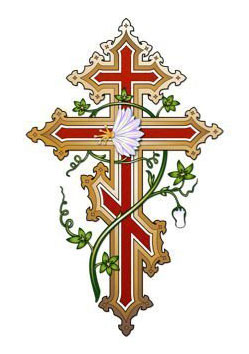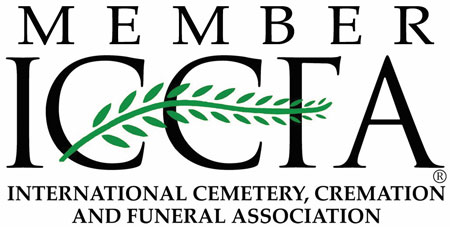The Meaning Of The Funeral Rites Of The Orthodox Church
From material supplied by Reverend Fathers
TarasMakowsky,
Gene Maximiuk,
Bohdan Hladio,
and Andrew Jarmus.
“Most assuredly, I say to you, the hour is coming, and now is, when the dead will hear the voice of the Son of God; and those who hear will live.” (John 5:25)
The Origins of Death
From the Book of Genesis, we find that human beings were not created to die. Living in intimate fellowship with God, humanity was to live forever by God’s grace. When we became unfaithful to God, disobeying His will through sin, our relationship with Him was severed. Since sin cut us off from Him who is the very Source of our life, with sin, death came into the world. [Genesis 3:19, Romans 6:23]
The pain we feel concerning the death of a loved-one stem from an awareness deep within us that we were made, not for death, but for life. The experience of death is not “natural”, but is a part of the fallen world. However, though the loss of a family member or friend is painful, we have the promise that this condition is not permanent.
The Resurrection of the Dead
Because of Christ’s death on the Cross, and His victory over death by His Resurrection (see Romans 5 & 6), we need no longer see death as the absolute end to our existence. Rather, death, in the light of Christ’s glorious resurrection, is viewed as a time of repose (“resting”) in the Lord.
Knowing deep within us that death is not part of the world as God intended it, we understand that these situations are worthy of our tears. However, we do not weep as those who have no hope [1Thess. 4:13-17]. We weep for the loss of the relationship we had with the departed, but in our hearts, there must be a certain peace—and even joy!—that our deceased loved-ones have gone to be at rest with the Lord. Moreover, our faith in our Savior assures us that He will resurrect us once again, reuniting body and soul and granting us transformed or “transfigured”/”spiritual” bodies that will no longer be vulnerable to pain, sickness and death. [see 1 Corinthians 15:35-44].
Why pray for the dead?
From the time of the Apostles, Orthodox Christians have offered prayers for the dead. They are offered because the Church is one, consisting of members both on earth (called the “Church Militant”) and in heaven (the “Church Triumphant”). Since, as members of the Church, we are obligated to pray for each other, there is no reason why we cannot pray for the dead.
The effect of our prayers for the dead is neither to “communicate” with them as in some kind of “seance”, nor to “send them to heaven,” but to provided spiritual comfort for both the deceased and for the grieving survivors. Our memorial prayers also reminded us of our own eventual death and our responsibility to prepare for it and to be ready for it. Trusting that God in His mercy will hear our supplications, we repeatedly offer up prayers for our beloved dead.
The Funeral Rites
The Open Casket: In the order of the funeral service is the remains of the deceased are to be blessed with holy water, the absolution prayer is read and then placed in the hand of the departed, and at the end of the service all the faithful are to proceed forward to give a final kiss to the departed. None of this is possible with the casket closed. These are all very powerful statements of our belief. To make all of this impossible by having a “closed casket funeral” is to impoverish our faith.
Even secular grief therapists, who have no religious background speak of the importance of the bereaved seeing the body of the departed loved one, and getting closure by saying their good-byes. Such a practice has been part of the wisdom of the Church for two centuries.
The Psalms: Integral to the funeral service is the chanting of Psalms, hymns found in the Old Testament. The introductory chant is Psalm 90 (91), which speaks of God’s firm promise of blessing and protection for all who have placed their trust in Him. Three sets of verses with refrains from Psalm 118 (119) speak of God’s great goodness and our utter dependence upon Him and His Law, which guides us through all the days of our life. Psalm 50 (51), a prayer of repentance, appeals to God’s steadfast love, compassion and gracious mercy for cleansing and forgiveness.
The Saints: As well as praying to the Lord directly, we petition His Saints to intercede for our departed loved-ones, entreating the loving-kindness of Christ, Who seeks us out and saves us. We ask God to grant rest to the soul of the departed “among the saints, where there is no more pain, sorrow, or suffering.”
The Prayer of Absolution: This is a prayer that the priest reads over the deceased in church, asking God to forgive every sin which the person has committed in his/her life, known and unknown, whether committed out of malice or weakness.
Fruit and Braided Bread (Kolach): Jesus said: “I am the bread of life” [John 6:35]. We express this reality by the use of bread during the funeral service. This bread is made in the form of a circle which symbolises eternity. A candle is placed in the loaf (the top loaf, if there are three) as another symbol of Christ, the Light of the world.
The fruit reminds us of our calling to be Christians not only in belief, but also to in producing the fruit of good works.
Kolyvo—boiled wheat and honey: Wheat is used as an expression of death and resurrection. Jesus said: “Unless a grain of wheat falls into the earth and dies, it remains alone, but if it dies, it bears much fruit” [John 12:24]. The honey or candies that are mixed into the Kolyvo are reminders of the sweetness and bless of eternal life that will follow our resurrection.
“Memory Eternal”: This hymn is taken from the Gospel accounts of Jesus’ crucifixion. The Lord is crucified with two thieves—one mocks Him with the crowd gathered to see Jesus on the cross, but the other repents of his sins and says to Jesus, “Remember me when You come in Your Kingdom.” [Luke 23:42] Jesus replies, “Very truly I tell you, today you shall be with me in Paradise.” [Luke 23:43] As we sing “Memory eternal” for our departed loved-ones, we are saying, “Remember them, Lord, when You come in Your Kingdom”.
The Last Farewell: Also known as the “Last Kiss”, this is the time for the people to say farewell to the mortal remains of the departed. Again, not denying the reality of death, the funeral rite invite everyone present to come and personally say farewell to the deceased.
Alive in Christ!
In its essence, the Funeral rite is a service of the resurrection. The hymns and prayers of faith and hope speak of life in Christ—eternal life bestowed because of faithfulness to god throughout our earthly pilgrimage. They are of profound spiritual beauty. In them, we encounter the awesome holiness of God who has established both us and the departed on the firmest of foundations—the rock of faith. In many respects, the funeral service may be properly called a service of thanksgiving for final liberation—the passage from physical life into the fullness of spiritual life and entry in the Promised Land.
Blessed is the way in which you walk
today, O soul; a place of rest has been
prepared for you. (Funeral Prokeimen)
UKRAINIAN ORTHODOX CHURCH OF CANADA
UOCC Contact
9 St. Johns’s Ave, Winnipeg, Manitoba R2W 1G8
1-877-586-3093 consistory@uocc.ca

Disclaimer: Every effort has been made to ensure the information in these pages is accurate and in accordance with Ukrainian Orthodox traditions. Please defer to Parish Priest if there is a discrepancy of information contained in these pages. We would appreciate being notified of any errors or omissions: contact@springfieldfuneralhome.com.




